牛津英语8A unit8知识点整理讲解学习
牛津英语8A unit8知识点整理
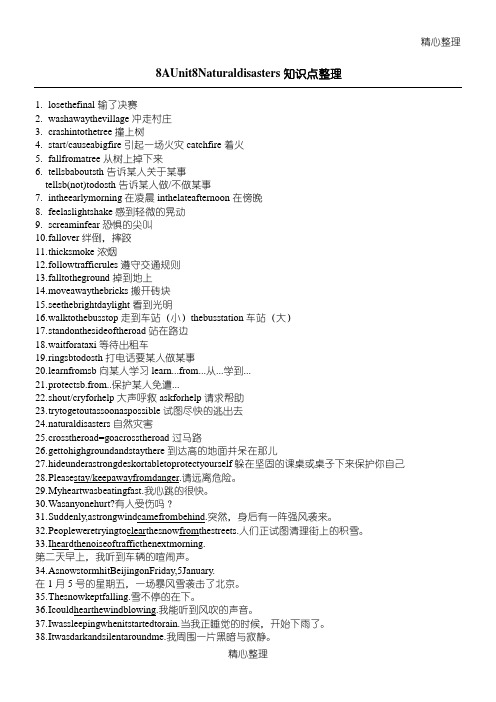
精心整理8AUnit8Naturaldisasters知识点整理1.losethefinal输了决赛2.washawaythevillage冲走村庄3.crashintothetree撞上树4.start/causeabigfire引起一场火灾catchfire着火5.fallfromatree从树上掉下来6.tellsbaboutsth告诉某人关于某事tellsb(not)todosth告诉某人做/不做某事7.intheearlymorning在凌晨inthelateafternoon在傍晚8.feelaslightshake感到轻微的晃动9.screaminfear恐惧的尖叫10.f allover绊倒,摔跤11.t hicksmoke浓烟12.f ollowtrafficrules遵守交通规则13.f alltotheground掉到地上14.m oveawaythebricks搬开砖块15.s eethebrightdaylight看到光明16.w alktothebusstop走到车站(小)thebusstation17.s tandonthesideoftheroad站在路边18.w aitforataxi等待出租车19.r20.l21.p22.s23.t24.n25.c26.g27.h28.P29.M30.W asanyonehurt?有人受伤吗?31.S uddenly,astrongwindcamefrombehind.突然,身后有一阵强风袭来。
32.P eopleweretryingtoclearthesnowfromthestreets.人们正试图清理街上的积雪。
33.I heardthenoiseoftrafficthenextmorning.第二天早上,我听到车辆的喧闹声。
34.A snowstormhitBeijingonFriday,5January.在1月5号的星期五,一场暴风雪袭击了北京。
新牛津英语8A-Unit-8词组、句型、语法

8A Unit 8词组、句型复习提纲二、重点句子及句型:1.My house is all wet。
我的房子都潮湿了.2.I was sleeping when it started to rain.开始下雨时我正在睡觉.3.Didn’t you hear the rain?难道你没听到雨声吗?4.There was water everywhere.到处都是水。
5.Who will mop up the water if I go home without you?谁将把水拖干如果没有你我回家?6. A young boy fall from a tree and hurts his legs。
小男孩从树上掉下并伤了腿。
7.Lightning starts a big fire in the classroom building。
闪电击使教学楼着火了。
8.Lightning hit a classroom building and it caught fire.闪电击中教学楼并着火了.9.People were running in all directions while pieces of glass and bricks were falling down .当玻璃碎片和砖块落下来的时候,人们朝四面八方跑去。
10.I felt nervous and my heart was beating fast。
我感到紧张并且心跳很快.11. A moment of fear went through my mind,but I told myself to calm down since I wasstill alive.片刻的恐惧掠过我的大脑,但我告诉自己冷静下来因为我还活着。
12.I started to pull myself slowly through the dark。
我开始在黑暗中慢慢地向前移动身体.13.I heard shouts from excited people我听到兴奋的人们发出的叫喊声。
初中英语 牛津译林版8A Unit8重要知识点知识点

初中英语牛津译林版8A Unit8重要知识点知识点e!I was in the middle of sleeping when the rain started to fall。
The phrase "when" introduces a time clause。
and "was sleeping" is in the past XXX is formed with "was/were + present participle (-ing)" and indicates an n that was in progress at a specific time in the past.XXX't you hear the rain。
This is a negative XXX expresses surprise。
disbelief。
disappointment。
or reproach。
In Chinese。
it can be translated as "难道。
不吗?" The negative interrogative sentence XXX:1) To express the XXX.XXX。
你还没有结束吗?2) XXX。
meaning "真是。
" XXX in Chinese。
Isn't it a fine day today。
今天的天气多么晴朗啊!3) To express criticism。
annoyance。
or reproach.Can't you walk a little faster。
难道你不能走快点吗?4) To make polite requests or XXX.Won't you come and have dinner with us。
Unit8知识点和考点2022-2023学年牛津译林版八年级英语上册
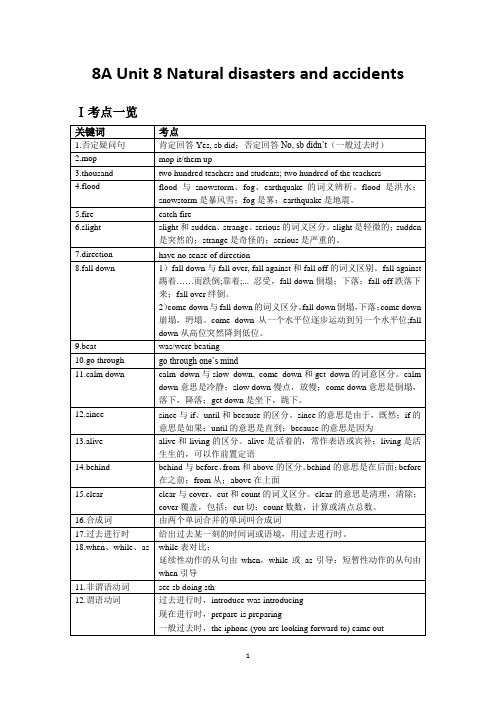
4.Flood washes away villages.
(1)flood的基本含义做名词,意思是洪水。
(2)flood的核心考点考察flood与snowstorm、fog和earthquake的词义辨析。flood是洪水;snowstorm是暴风雪;fog是雾;earthquake是地震。
4. A terrible _____ hit the village. It washed away lots of houses.
11.calm down
calm down与slow down, come down和get down的词意区分。calm down意思是冷静;slow down慢点,放慢;come down意思是倒塌,落下,降落;get down是坐下,跪下。
12.since
since与if、until和because的区分。since的意思是由于,既然;if的意思是如果;until的意思是直到;because的意思是因为
3.There were _______ teachers and students sitting at our school’s playground to watch the performance of the new year’s celebration.
A. Two thousand of B. Two thousand C. Thousand of D. Two thousands of
7.direction
have no sense of direction
8.fall down
1)fall down与fall over, fall against和fall off的词义区别。fall against踢着……而跌倒;靠着;...忍受,fall down倒塌;下落;fall off跌落下来;fall over绊倒。
牛津译林版8AUnit8知识点

Unit5-8 (知识点)【划线的是易考知识点】----------------------【必考】Unit 2 前缀-ly: badly(副词)friendly(形容词)【clearly】Unit 3 后缀-ful(+);-less (―)【特殊:单个:endless;noiseless;sleepless;cheer】l Unit 4 前缀(表否定):un- ;in- ;im-【impossible]Unit 5 后缀(转化为名词):-ing; -ness-ion【频率高:ill ness;mea nin gless;beg innin g;helpless;los in g;discussio]Unit 6 后缀(表示人):-er;-or;ist【tourist(s)]Unit 7后缀(名词变形容词):-y【表示天气的词语变形】【频率高:foggy;rainy]【少数副词和形容词同形:fast, early, lo ng i【注意:good— well, near—nearly , hard -- hardly 】Unit 5单词词组Welcome to the unit1. would like to do sth.想要做某事would like sb. to do sth 想要某人做某事2. could sb. please do sth.? could sb. please not do sth.?3. wild野生的【会在单词填空出现,live in the wild生存在野外】4. have /take pity on sb.同情某人It's a pity!真遗憾!5. die【非选择题中易考时态变形,die <动词>死亡过去式:died 现在分词:dying (也可作形容词:垂死的)形容词:dead 名词:death】eg. His father died ten years ago.His father's death makes him feel sad.His father was dead.The doctor saved a dying boy.6.In fact事实上7. 动物的词汇:dolph in squirrel zebra sparrow swallow 等Read ing1. da nger <名词> 危险adj. dan gerous 危险的be in dan ger 处境危险be out of dan ger 脱离危险2. —开始in the begi nning --------------------------------------------◊at the begi nning 常与of 连用,表示“在 . 之初”。
Unit8知识点提要牛津译林版英语八年级上册
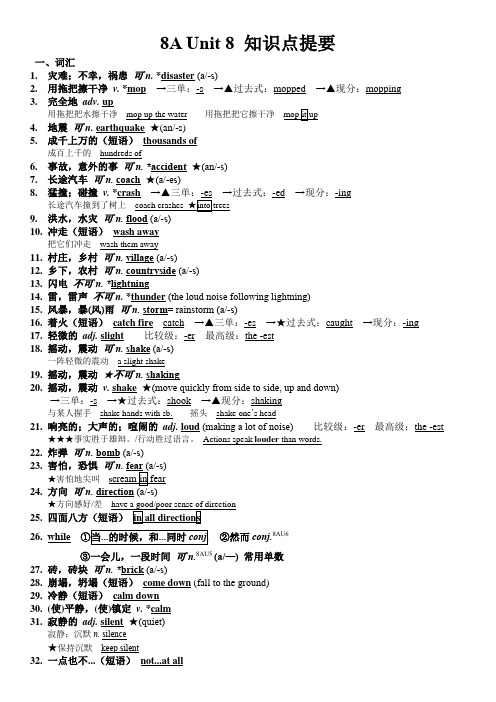
8A Unit 8 知识点提要一、词汇1.灾难;不幸,祸患可n. *disaster(a/-s)2.用拖把擦干净v. *mop→三单:-s →▲过去式:mopped →▲现分:mopping3.完全地adv. up用拖把把水擦干净mop up the water 用拖把把它擦干净4.地震可n. earthquake ★(an/-s)5.成千上万的(短语)thousands of成百上千的hundreds of6.事故,意外的事可n. *accident ★(an/-s)7.长途汽车可n. coach ★(a/-es)8.猛撞;碰撞过去式:-ed →现分:-ing9.洪水,水灾可n. flood (a/-s)10.冲走(短语)wash away把它们冲走wash them away11.村庄,乡村可n. village (a/-s)12.乡下,农村可n. countryside (a/-s)13.闪电不可n. *lightning14.雷,雷声不可n. *thunder(the loud noise following lightning)15.风暴,暴(风)雨可n. storm= rainstorm(a/-s)16.着火(短语)catch fire catch →▲三单:-es →★过去式:caught →现分:-ing17.轻微的adj. slight 比较级:-er 最高级:the -est18.摇动,震动可n. shake (a/-s)一阵轻微的震动 a slight shake19.摇动,震动★不可n. shaking20.摇动,震动v. shake★(move quickly from side to side, up and down)→三单:-s →★过去式:shook →▲现分:shaking与某人握手shake hands with sb. 摇头shake one’s head21.响亮的;大声的;喧闹的adj. loud (making a lot of noise)比较级:-er 最高级:the -est★★★事实胜于雄辩。
牛津译林版八年级英语上册8A unit8知识点总结
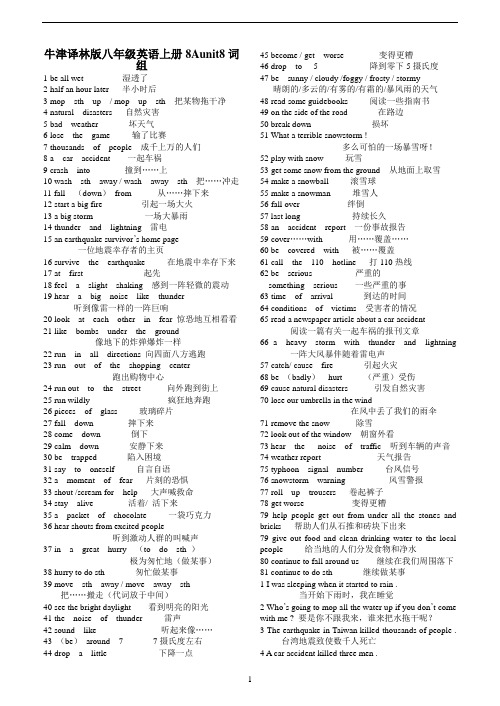
牛津译林版八年级英语上册8Aunit8词组1 be all wet 湿透了2 half an hour later 半小时后3 mop sth up / mop up sth 把某物拖干净4 natural disasters 自然灾害5 bad weather 坏天气6 lose the game 输了比赛7 thousands of people 成千上万的人们8 a car accident 一起车祸9 crash into 撞到……上10 wash sth away / wash away sth 把……冲走11 fall (down)from 从……摔下来12 start a big fire 引起一场大火13 a big storm 一场大暴雨14 thunder and lightning 雷电15 an earthquake survivor’s home page一位地震幸存者的主页16 survive the earthquake 在地震中幸存下来17 at first 起先18 feel a slight shaking 感到一阵轻微的震动19 hear a big noise like thunder听到像雷一样的一阵巨响20 look at each other in fear 惊恐地互相看看21 like bombs under the ground像地下的炸弹爆炸一样22 run in all directions 向四面八方逃跑23 run out of the shopping center跑出购物中心24 run out to the street 向外跑到街上25 run wildly 疯狂地奔跑26 pieces of glass 玻璃碎片27 fall down 摔下来28 come down 倒下29 calm down 安静下来30 be trapped 陷入困境31 say to oneself 自言自语32 a moment of fear 片刻的恐惧33 shout /scream for help 大声喊救命34 stay alive 活着/ 活下来35 a packet of chocolate 一袋巧克力36 hear shouts from excited people听到激动人群的叫喊声37 in a great hurry (to do sth )极为匆忙地(做某事)38 hurry to do sth 匆忙做某事39 move sth away / move away sth把……搬走(代词放于中间)40 see the bright daylight 看到明亮的阳光41 the noise of thunder 雷声42 sound like 听起来像……43 (be)around 7 7摄氏度左右44 drop a little 下降一点45 become / get worse 变得更糟46 drop to -5 降到零下5摄氏度47 be sunny / cloudy /foggy / frosty / stormy晴朗的/多云的/有雾的/有霜的/暴风雨的天气48 read some guidebooks 阅读一些指南书49 on the side of the road 在路边50 break down 损坏51 What a terrible snowstorm !多么可怕的一场暴雪呀!52 play with snow 玩雪53 get some snow from the ground 从地面上取雪54 make a snowball 滚雪球55 make a snowman 堆雪人56 fall over 绊倒57 last long 持续长久58 an accident report 一份事故报告59 cover……with 用……覆盖……60 be covered with 被……覆盖61 call the 110 hotline 打110热线62 be serious 严重的something serious 一些严重的事63 time of arrival 到达的时间64 conditions of victims 受害者的情况65 read a newspaper article about a car accident阅读一篇有关一起车祸的报刊文章66 a heavy storm with thunder and lightning一阵大风暴伴随着雷电声57 catch/ cause fire 引起火灾68 be (badly)hurt (严重)受伤69 cause natural disasters 引发自然灾害70 lose our umbrella in the wind在风中丢了我们的雨伞71 remove the snow 除雪72 look out of the window 朝窗外看73 hear the noise of traffic 听到车辆的声音74 weather report 天气报告75 typhoon signal number 台风信号76 snowstorm warning 风雪警报77 roll up trousers 卷起裤子78 get worse 变得更糟79 help people get out from under all the stones andbricks 帮助人们从石推和砖块下出来79 give out food and clean drinking water to the localpeople 给当地的人们分发食物和净水80 continue to fall around us 继续在我们周围落下81 continue to do sth 继续做某事1 I was sleeping when it started to rain .当开始下雨时,我在睡觉2 Who’s going to mop all the water up if you don’t comewith me ? 要是你不跟我来,谁来把水拖干呢?3 The earthquake in Taiwan killed thousands of people .台湾地震致使数千人死亡4 A car accident killed three men .1一起车祸致使3人死亡5 A coach crashed into a tree last night .一辆大巴昨晚撞上一棵树6 A flood washed the village away .一场洪水冲毁村庄7 Lightening started a big fire in a house .闪电引起了一间房屋燃起了大火8 A young boy fell from a tree and hurt his legs .一位小男孩从树上跌下,弄伤了腿9 A big storm killed 20 people .一场暴雨致使20人死亡10 At first ,I felt a slight shaking through my body .起初,我感到全身一阵轻微的摇晃11 People in the shopping center looked at each other in fear . 购物中心的人们惊恐地看着对方12 People were running wildly while pieces of glass and bricks were falling down .玻璃碎片和砖块落下的同时,人们疯狂地奔跑着13 I could not believe it was over .我不能相信一切都结束了14 I could not see anything at all . 我根本看不到东西15 I did not know if anyone was around me .我不知道我周围是否有人16 A moment of fear went through my mind but I told myself to calm down since I was still alive .我的脑中掠过一阵恐惧,但我告诉自己要镇定下来,因为我仍然还活着17 I was trying to find my way out when I suddenly heard some noise above me .当我听到我上方有些声音的时候,我正在找出口18 I heard shouts from excited people .我听到了激动的人群的叫喊声19 They were in a great hurry to move away the bricks and stones . 人们迫不及待地移开砖块和石头20 He survived the earthquake in 1999 .他在1999年的地震中幸存下来了21 It sounded like bombs under the ground .听起来就像地下的炸弹在爆炸22 What’s the weather like today ?=How is the weather today ? 今天天气怎么样?23 The temperature will be around 7 .气温将在7度左右24 The temperature is going to drop a little .气温将要下降一点25 The weather won’t be too bad . 天气将不算太坏26 The temperature will be lower . 气温将更低27 The weather will become worse on Friday .周五的天气将更糟28 The temperature will drop to -5 .气温将降到零下5度29 I saw you and your parents standing on the side of the road . 我看到你和你的父母站在路边30 Why didn’t your father drive you to school as usual ?为什么你的父亲不像往常一样开车送你去上学?31 His car broke down because of the cold weather .因为天冷,他的车坏了32 While Daniel was making a snowball , he fell over .在丹尼尔滚雪球的时候,他绊倒了33 Suzy was making a snowman while kitty wasstanding beside her .苏珊在堆雪人,凯蒂站在她的边上34 A snowstorm hit the city early this morning .今天清早,一场暴雪袭击了这个城市35 During the snowstorm , the 110 hotline received acall from Mr Su .在暴雪期间,110热线接到了孙先生的来电36 The snow was really heavy by then .那时雪真的很大37 This morning I read a newspaper article about a caraccident . 今天早晨我阅读了一篇一起车祸的报道38 His car crashed into a tree while he was driving in thesnowstorm .他在暴雪中驾车时车子撞到了一棵树上39 Did you hear about the fire at a school in Britain lastweek ?你听说到上周英国的一所学校着火的事了吗?40 There was a heavy storm with thunder and lightning .伴随着雷电,下起了一场大暴雨41 Her school caught fire because lightning hit it .她的学校着火是因为闪电击中它42 As it was a holiday , no one was at school .由于是假期,没有人在校43 Bad weather sometimes causes natural disasters .坏天气有时会引起自然灾害44 The fireman put out the fire soon .It didn’t last long .消防队员很快扑灭了火,没有持续很久45 Snow continued to fall around us.雪继续在我们周围降下来46 Suddenly a strong wind came from behind .突然一股强风从背后吹过来47 We lost our umbrella in the wind and I nearly fellover . 我们在风中丢了雨伞,我差一点摔倒48 I heard the noise of traffic the next morning .第二天早晨我听到了车辆的声音49 I looked out of the window and saw that people wereworking hard to remove the snow .我朝窗外看,看到人们在奋力除雪50 The video shows the terrible situation after theearthquake . 光碟上播放出了地震后的可怕的场景51 Soldiers were helping people get out from under allthe stones and bricks .战士们正在帮助人们从所有的石块和砖块下出来52 Some social workers were looking after the people inneed while others were giving out food and clean drinking water to the local people .一些社会工作者们正在照料需要帮助的人,同时另外的人正在给当地居民分发食物和干净的饮用水2书面表达Accident report formAccident Their house was on fire . Weather conditions There was a lightnig Date of call March 8Time of call 8.30a.m.Name of caller JimPlace on Nanjing RoadNo. of victims threeConditions of victims Jim and his mother were OkHis fater’s left hand was hurt . Action Policemen arrived at 8.35a.m.Sent the victims to hospital at 8.40a.m.Jim called the 110 hotline at at 8.30 a.m. on March .Their house was on fire on Nanjing Road because there was a lightning . He and his parents were trapped in the house . He and his mother were OK . But his father’s left hand was hurt . The policemen arrived at 8.35 a.m. and sent them to hospital at once .一、过去进行时的概念及构成过去进行时表示过去某一时刻或某段时间正在进行的动作。
译林牛津英语8A Unit 8单词讲解(共68张PPT)

nearly [ˈnɪəli] adv.
近义词:almost
clear [klɪə(r)] v.
clear adj. 清楚的、晴朗的
behind [bɪˈhaɪnd] prep.
disaster mop up earthquake thousands of accident coach crash flood wash away village lightning storm thunder catch fire slight shake
heart [hɑːt] n.
heart disease 心脏病
beat [biːt] v.
beat v. 打败
trapped [træ pt] adj.
be trapped in
mind [maid] n.
in one's mind 在某人心中
mind v. 介意(doing)
calm [kɑːm] v.
board [bɔːd] n.
abroad 在国外
weekday [ˈwiːkdeɪ] n.
headache [ˈhedeɪk] n.
toothache [ˈtuːθeɪk] n.
countryside [ˈkʌntrisaɪd] n.
housework [ˈhaʊswɜːk] n.
pancake [ˈpæ nkeɪk] n.
in all directions in the direction of
while [waɪl] conj.
The man used to take a walk after dinner while he lived in the country. (延续性动词)
译林版牛津英语8A Unit8单元知识点讲解+测试卷(附答案)

8A Unit 8 Natural disasters单元重点知识点总览1.start to do/doing sth. begin to do/doing sth 开始做某事2.wake up 醒来;wake sb up 喊醒;叫醒3. mop up 擦干,抹去含有up的短语:use up 用完eat up 吃完climb up 爬上去lift up 举起来go up 上涨come up to 接近;靠近pick up 捡起look up 抬头看;查找turn up 调大catch up with 赶上某人give up 放弃fix up 修理make up 编写put up搭建set up 建立4.hundreds of 数以百计的;thousands of 成千上万的;millions of 数以百万计的5.crash v. 撞击,碰撞;crash n. 撞车事故6.wash away冲走含有away的短语:move away 移开put away 收拾go away 离开take away 拿走7.hear about/of 听说;hear from 收到……来信8.at first“起先;刚开始”,相当于at the beginning,反义短语at last“最后”9.“in+名词”表示处于某种状态中in danger 处于危险中in trouble 处于麻烦中in pain 处于疼痛中10.run out 跑出去;用光;run out of 从……跑出去;把……用光11.try one’s best to do sth=do one’s best to do sth 尽力做某事12.while连词,表示“当……时候;在……时候”13.if作连词,表示“是否”,也可以引导条件状语从句。
14.beat 心脏/的跳动;敲击;打败15.表示“穿过”的三个介词through, across, over的区别16.since引导原因状语从句,意为“既然,由于”17.alive的用法,常作表语18.一段时间+later=after+一段时间19.asleep和sleepy的比较20.on both sides of the road; on each/either side of21.as……as possible 尽可能……,相当于as……as one can,as……as中间加上形容词和副词原级22.keep+宾语+宾补,宾语补足语可以是形容词、副词、现在分词、过去分词、介词短语23.stay away from=keep away from 远离语法:现在完成时(1)1、过去进行时①定义②构成③用法2、when, while, as的用法比较单元重点短语归纳1.thousands of 成千上万2.wash away 冲走3.in all directions 四面八方e down 崩塌5.not...at all 一点也不6.catch fire 着火7.find one’s way out 找到出路8.because of 因为,由于9.as...as possible 尽可能...10. break down 出故障,坏掉11.mop up 擦干,抹去12.hear about/of 听说13.in fear 处于恐慌中14.run out 跑出去;用光15.say to oneself 自言自语16.go through 穿过17.calm down 冷静;平静18.shout for help 喊救命19.find one’s way out 找出路20.be trapped 被困21.at the same time 同时22.learn from 从……中学习23.on fire 着火24.stay away from 远离25.crash into 撞上26.cover...with...用……覆盖……27.protect...from...保护……免受……句型归纳1.try one’s best to do sth. 尽力做某事2.keep+宾语+宾补使……怎么样3.see sb. doing sth. 看到某人正在做某事4.ask sb. to do sth. 要求某人做某事5.have to do sth. 不得不做某事6.when...did, ...was/were doing 当……时候,正在……7.while...was/were doing, ...did 当正在……,这时……8.while... was/were doing, ...was/were doing 正在……,而正在……8A Unit 1单元测试(A) 卷一、短语翻译(每题1分,共10分)1、醒来2、擦干3、成千上万的4、撞上5、冲走6、远离7、尽快8、冷静9、从……跑出来10、在恐慌中二、单项选择(每题1分,共15分)( ) 1. (2013湖北孝感) After the Asian Games, people came to Guangzhou for a visit during holidays.A.thousandB. thousandsC. thousand ofD. thousands of ( ) 2. (2014天津) We have never visited the museum, but we have it.A.stood forB. belonged toC. heard aboutD. kept to ( ) 3. (2010江苏无锡) Don’t drive so fast! We must slow down when we drive the tunnel.A.pastB. acrossC. overD. through ( ) 4. (2013 江苏徐州) Millie a picture when Mr Green came in.A.drawB. will drawC. drewD. was drawing ( ) 5. (2013 浙江衢州) —Sam, what will the weather be like tomorrow?—Sorry, Mum. I didn’t watch the weather forecast just now. I a football match.A.was watchingB. am watchingC. would watchD. will watch ( ) 6. (2013 浙江衢州) Many children are left alone in the countryside. Let’s try our best them.A.helpB. helpingC. to helpD. helps ( ) 7. (2013 山东德州) Oh, no! It’s raining. we can’t go skating on the square. !A.What a shameB. Well doneC. What a surpriseD. how wonderful( ) 8. (2013 山东滨州) It’s reported that president Xi Jinping arrived Moscow March 22nd and paid a three-day visit to Russia.A.at;onB. in;onC. at;inD. in; in ( ) 9. (2013 甘肃白银) I haven’t decided when a holiday yet.A.tookB. takingC. to takeD. take( ) 10. (2014 江苏扬州) The driver an e-book on his mobile phone while driving.A.was readingB. readC. readsD. is reading ( ) 11. (2012 江苏宿迁) Eddie was sleeping Millie was reading a magazine.A.untilB. whileC. beforeD. after( ) 12. (2013 浙江杭州) There was a rainstorm yesterday. The flood the old bridge over the small river.A.washed awayB. went awayC. kept awayD. put away ( ) 13. (2011 福建泉州) I first met Lisa three tears ago. She at a radio shop at that time.A.has workedB. was workingC. had been workingD. had worked ( ) 14. (2014 河南周口) He kept telling himself . He knew he could do well if he tried.A.not to nervousB. don’t be nervousC. not to be nervousD. didn’t be nervous( ) 15. (2010 江苏镇江) The plane will take off three hours. I must get to the airport right now.A.inB. forC. onD. at三、完形填空(每题1分,共10分)(2013 山东菏泽)It's very common to meet different people in public places.When I was 12 years old,I got a small job in a 1 ,On my first day at work,I didn't come home for lunch. When I came home at night, Mum asked, “How did you 2 your lunch, dear?”I answered,“I made some new friends in the supermarket, twin brothers, their mom and dad. They were my customers. They invited me 3 lunch."Mum was happy that I had made new friends but she wanted to know what kinds of 4 they might be.Several days later,I asked my friends to come to the supermarket where l worked 5 let Mum meet them. Mum was very 6 to find out that the twin brothers were joined at the chest(胸部).She felt very strange because I didn't tell her about that before.When Mum asked me about this,I said,“I know that too. But do you know that their mom has to make all clothes because it's 7 difficult to find anything to fit them? They're also good 8 .That day, Joe, the one on the right, made me noodles for lunch."When Mum saw the twins, she must have thought how strange they 9 . But to me, what I cared about was that they had difficulty 10 clothes and they were goodcooks.( ) 1. A.supermarket B.post office C.factory D.bank( ) 2. A.find B.make C.manage D.eat( ) 3. A.at B.for C.after D.before ( ) 4. A.men B.women C.boys D.people ( ) 5. A.and B.but C.or D.so( ) 6. A.surprised B.excited C.interested D.disappointed ( ) 7. A.so B.very C.too D.really( ) 8. A.friends B.singers C.workers D.cooks( ) 9. A.smelled B.looked C.felt D.sounded ( ) 10. A.selling B.making C. wearing D.buying四、阅读理解(每题2分,共30分)A(2013山东滨州)A 7-magnitude(震级)earthquake hit Ya'an,Sichuan at 8:02 on April 20, 2013, and it killed at least 196 people and injured more than 11,000.Together with other students, Yang Xuelan ran out to the playground. She was safe. But all her textbooks and exercise books were buried(埋)in the teaching building. What can we do when an earthquake happens? In fact, there's little we can do to stop natural disasters (自然灾害) such as earthquakes happening. But, some methods can reduce the harm they cause.◆ Drop down onto your hands and knees. This way can protect you from falling.◆ Cover your head under a strong table or desk. You can also stay along awall,and cover your head with your arms and hands.◆ Hold on to(守住,抓牢) your shelter(遮蔽物) until the shaking stops. Be prepared to move with your shelter if the shaking continues.Schools can normally take the earthquake drills(演练) to help student stay alive. ( ) 1. How many people lost their lives in the earthquake in Ya'an?A. At least 196.B. More than 11,000.C. Less than 196.D. About 11,196.( ) 2. When the earthquake happened in Ya'an, Yang Xuelan was .A. at homeB. at schoolC. on her way to schoolD. playing on the playground( ) 3. What does the underlined word "reduce" mean in Chinese?A.提高B.阻止C.增加D.减少( ) 4. According to the writer, we can to reduce the harm natural disasters ca use.A. do nothingB. stay at homeC. take some methodsD. run out of the house( ) 5. Which of the following can help you stay alive in an earthquake?A. Dropping down on to your hands and knees.B. Covering your head under a strong table or desk.C. Holding on to your shelter until the shaking stops.D. A, B and C.B(2013广东广州)Once when I was a teenager, my father and I were standing in line to buy tickets for the circus. Finally, there was only one family between the ticket office and us. This family made a big impression on me.There were eight children, all probably under the age of 12. You could tell they didn’t have a lot of money. Their clothes were not expensive, but they were clean. The children talked excitedly about the clowns. It was clearly a very important day out for them. The father and mother seemed happy as they could be.The tickets lady asked how many tickets the father wanted, he proudly answered, “Please let me buy eight children’s tickets and two adults’ tickets, so I can take my family to the circus.”The ticket lady told him the price.The man’s wife lowered her head. There was no longer a smile on the man’s face. He quietly asked, “How much did you say?”The ticket lady again told him the price.The man obviously didn’t have enough money. But how could he tell his kids the bad news?Seeing what was happening, my dad took a $20 note from his pocket and dropped in on the ground. (We were not rich ourselves at all!) He then tapped the man on the shoulder and said, “Excuse me, sir, you dropped this.”The man understood my father was helping him. He picked up the money, looked straight into my dad’s eyes, and in tears replied. “Thank you. This really means a lot to me and my family.”Although we did not go to the circus that night, we didn’t go without.( ) 6. Why does the writer say “Their clothes were not expensive, but they were clean” ( Paragraph 2)?A. To show the children were well looked after.B. To show cheap clothes could be popular.C. To show how hard the mother worked.D. To show how rich the family were.( ) 7. Why was the poor man unhappy after he spoke with the ticket lady?A. He had lost his money.B. His children were noisy.C. The tickets were sold out.D. The tickets were too expensive. ( ) 8. Who did the $20 note belong to?A. The poor man .B. The writer’s father.C. The poor man’s wife.D. The ticket lady.( ) 9. Why was the poor man in tears at the end of the story?A. He found the money he lost.B. He wanted others to help him.C. He made his children unhappy.D. He was thankful for the kindness. ( ) 10. Which of the following statements is probably true according to the passage?A. The poor mans saw the circus that night.B. The two families became close friends.C. The writer’s father earned some money.D. The writer saw the circles that night.C(2010江苏南京)Presents For Children’s DayCharles M. Schulz was born in 1922 in Minneapolis, the only child of a housewife and a barber. His interest in comics was encouraged by his father, who loved the funny pages. Charles M. Schulz sold seventeen cartoons to the Saturday Evening Post from 1948 to 1950 and Li’l Folks to the St. Paul Pioneer Press. Peanuts debuted(首次露面) on October 2, 1950, and ran without interruption(中止)for the next fifty years. Charles M. Schulz died in 2000.●IT’S A DOG’S LIFE SNOOPYIt’s a Dog’s Life, Snoopy brings all your familiar friends together for great times and fun.●IT’S A BIG WORLD CHARLIE BROWNCharlie Brown faces some of life’s little challenges with the help of Snoopy, Lucy, Peppermint Patty, Linus, and the rest of the gang(一伙) in It’s a Big World, Charlie Brown.●PEANUTS 2000The last one is the special edition Peanuts 2000, which includes all the last year’s Peanuts comic strip and Charles M. Schulz’s famous farewell strip.Come and visit our website at or come to Ballantine Bookshop, you’ll have a big surprise.( ) 11. Why did young Charles become interested in comics?A. He wanted to sell cartoonsB. His mother encouraged him.C. Cartoons brought him great times and funD. His father’s love for the funny pages influenced him.( ) 12. When did Peanuts first appear in public?A. In 1922B. In 1948C. In 1950D. In 2000( ) 13. Who doesn’t belong to the Peanuts gang?A.Snoopy.B. Lucy.C. Charles M. Schulz.D. Peppermint Patty.( ) 14. Which of the following appeared last?A. Peanuts 2000B. Li’l FolksC. It’s a Dog’s Life, SnoopyD. It’s a Big World, Charlie Brown.( ) 15. What do you think the passage is?A. A novelB. A menuC. A diaryD. An advertisement五、任务型阅读(每题1分,共10分)阅读下列短文,根据短文中的信息完成文后的表格(每空一词)The haze(雾霾)season is back. How much do you know about haze? Haze can also be called “Smog”. The word "smog" is from the words “smoke” and “fog”, it first appeared in the early 20th century, It is a kind of air pollution(污染)caused(导致)mostly by cars and factories.Smog will do great harm(伤害)to your health, especially lungs(肺).It can make you cough and cause skin and eye problems. It seems that we can do nothing to stop it, but only wait until the wind blows all the smog away. However, there are some easy ways to prevent it hurting you. Here are some of them.1. Don’t do exercise in the open.Exercising in the open makes you breathe(呼吸)deeply, and you will take in the particles(颗粒物)deep into your lungs.2. Stay indoors and keep the air clean.If you can, just stay in your room and keep the doors and windows closed. Remember to air your room twice a day, you can open the window at noon or at night for half an hour.3. Wear a mask.Paper and cotton masks can not help you in the haze weather. Some special masks, such as N95 masks, can keep you from breathing in the particles in the air.4. Change your diet.Scientists find that vitamin A, C and E can greatly help protect your eyes, nose and lungs. So eat more green vegetables and fresh fruit everyday. What’s more, do not eat food with too much fat(脂肪),it’s bad for your lungs.The haze weatherWhat is haze?It 1 smog, a kind of smoky and 2 weather. It is a kind pollution caused by cars and 3 .What is theharm?It is 4 for our health.5 to prevent the haze? Don’t6 outside.Stay indoors as 7 as possible with the doors and windows closed.Remember to open the windows for a while to keep the 8 clean.9 a mask to prevent taking in the particles.Change your diet. Vitamins can make you healthy. So, please eat more vegetables and fruit and 10 meat.6. 7. 8. 9. 10.六、用所给词的适当形式填空(每题1分,共15分)1. When I got home yesterday afternoon, it (rain) hard.2. On a (snow) morning, many cars hit each other.3. The lift didn’t work and we were (trap) inside.4. I know that many (visit) come to China every day.5. They always have fun (talk) to each other.6. Do you like the basketball player (name) Lin Shuhao?7. He gave me some (advise) on how to learn English?8. (nature) disasters kill a lot of people every year.9. Which (direct) did they go to? Do you know?10. It took (near) two hours to get there.11. The average person’s heart (beat) 70 times a minute, right?12. Alice was laughing and joking, but her sister remained (silence).13. I couldn’t fall (sleep) last night because of the exciting news.14. I wish you would stop (shout) at the children.15. It is too (noise) outside for me to hear you clearly.七、根据短文内容及首字母提示完成单词(每题1分,共10分)There are too many accidents in cities. Accidents often happen when people c 1 the roads or streets. Read the passage c 2 and learn to be careful later on. Be careful when it is r 3 . Many a 4 happen on rainy days. People are in a h 5 because they don’t want to get wet. They often cross the roads q 6 . Often they c 7 see clearly as they hold their u 8 in front of them. Remember that cars take m 9 time to stop when the roads are a 10 wet. When it is raining, we must be more and more careful, not less careful.1. 2. 3. 4. 5.6. 7. 8. 9. 10.8A Unit 8单元测试(A) 卷参考答案一、短语翻译(每题1分,共10分)1. wake up2. mop up3. millions of4. crash into5. wash away6. stay/keep away from7. as soon as possible8. calm down9. run out of10. in fear二、单项选择(每题1分,共15分)1-5 DCDDA 6-10 CABCA 11-15 BABCA三、完形填空(每题1分,共10分)1-5 ACBDA 6-10 ACDBD四、阅读理解(每题2分,共30分)1-5 ABDCD 6-10 ADBDA 11-15 DCCAD五、任务型阅读(每题1分,共10分)1.means2. foggy3. factories4. bad5. Ways6. exercise7. much/often8. air9. Wear 10.less六、用所给词的适当形式填空(每题1分,共15分)1. was raining2. snowy3. trapped4. visitors5. talking6. named7.advice8. Natural9. direction 10. nearly11. beats 12. silent 13. asleep 14. shouting 15. noisy七、根据短文内容及首字母提示完成单词(每题1分,共10分)1.cross2.carefully3. rainy4. accidents5. hurry6. quickly7. can’t8. umbrellas9. more 10.all8A Unit 8单元测试(B) 卷一、短语翻译(每题1分,共10分)1、着火2、自言自语3、听说4、向四面八方5、出故障6、尽可能7、用……覆盖……8、保护……远离……9、找出出路10、在清晨二、单项选择(每题1分,共15分)( ) 1. (2010 江苏泰州) you offered him!A. How useful adviceB. What a useful adviceC. How a useful adviceD. What useful advice( ) 2. (2010江苏徐州) ---Our car when we were driving along the path. And it took us two hours to repair it.---Sorry to hear that.A.broke downB. broke awayC. broke upD. broke out ( )3.(2012江苏苏州) The chairperson received about three_________applications to join the Birdwatching Club.A.hundredB. hundreds ofC. hundred ofD. hundreds ( ) 4. (2012年山东济宁)Sam likes trekking_______the jungle, because he thinks it's exciting.A.overB.underC.acrossD.through ( ) 5. (2013山东德州) Although many great people ever failed, they never_______ and managed to succeed.A.set outB. stayed upC. kept onD. gave up ( ) 6. (2011 重庆) ---Do you mind if I turn on the TV?--- . My father is sleeping.A.Better notB. Not at allC. No, I don’t mindD. That’s all right( ) 7. (2012湖北恩施)---I called you last night, but you didn’t answer it.---I’m terribly sorry. I a meeting at that time.A.hadB. was havingC. am havingD. had had ( ) 8. (2012 贵州安顺) Could you please give some to the teachers.A.advice;manB. advices;men。
上海牛津英语8Aunit8单词详解

Adj.
Finish-finished
Worry-worried
Please-pleased
You’refinished,all of you.
attack
v.
attack against〔on〕the enemy
Silently
Ahugefigurewasmoving silentlytowards the captain’s house.
trap
n.
v.设圈套
Trap in
In pieces
You come in peace, buttommrrowyou’ll be in pieces.
offer
v.
n.提议
Offer to dosth.
The man offered 500yuan for this red horse.
不可与give同用
vt.要求;打(击);碰撞;偶然发现;符合
n.讽刺;打(击);冲撞;成功
hit既可用作及物动词,也可用作不及物动词。用作及物动词宾语指人时,后可接on〔in〕,表示“击”“打”身体某部位;后接on〔against〕时,表示身体某部分碰或撞在某物上。用作不及物动词时,后接介词against〔at〕表示碰撞或打击
关于感叹句what和how的区别:
一、由"what"引导的感叹句:"what"意为"多么"用作定语,修饰名词(被强调部分),单数可数名词前要加不定冠词a/an,复数可数名词或不可数名词前不用冠词。这类句子的结构形式是:
what+(a/an)+adj.+n.+主语+谓语+(it is).
牛津英语8A Unit8 natural disasters 单元知识梳理
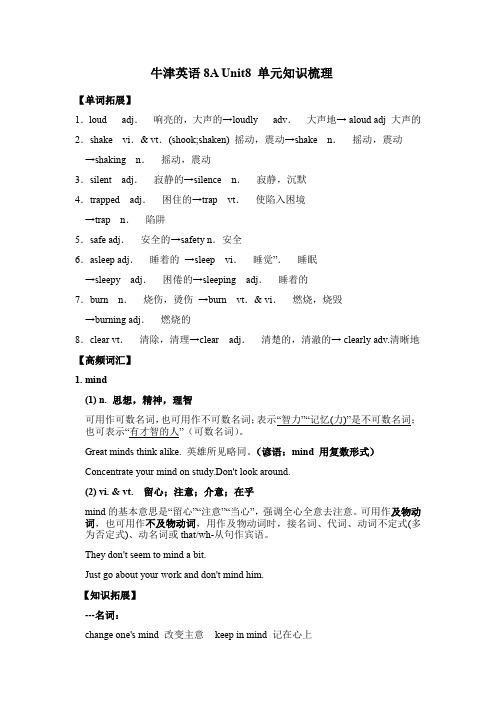
牛津英语8A Unit8 单元知识梳理【单词拓展】1.loud adj.响亮的,大声的→loudly adv.大声地→ aloud adj 大声的2.shake vi.& vt.(shook;shaken) 摇动,震动→shake n.摇动,震动→shaking n.摇动,震动3.silent adj.寂静的→silence n.寂静,沉默4.trapped adj.困住的→trap vt.使陷入困境→trap n.陷阱5.safe adj.安全的→safety n.安全6.asleep adj.睡着的→sleep vi.睡觉”.睡眠→sleepy adj.困倦的→sleeping adj.睡着的7.burn n.烧伤,烫伤→burn vt.& vi.燃烧,烧毁→burning adj.燃烧的8.clear vt.清除,清理→clear adj.清楚的,清澈的→ clearly adv.清晰地【高频词汇】1. mind(1) n. 思想,精神,理智可用作可数名词,也可用作不可数名词;表示“智力”“记忆(力)”是不可数名词;也可表示“有才智的人”(可数名词)。
Great minds think alike. 英雄所见略同。
(谚语:mind 用复数形式)Concentrate your mind on study.Don't look around.(2) vi. & vt. 留心;注意;介意;在乎mind的基本意思是“留心”“注意”“当心”,强调全心全意去注意。
可用作及物动词,也可用作不及物动词,用作及物动词时,接名词、代词、动词不定式(多为否定式)、动名词或that/wh-从句作宾语。
They don't seem to mind a bit.Just go about your work and don't mind him.【知识拓展】---名词:change one's mind改变主意keep in mind记在心上lose one's mind失去理智make up one's mind to do sth. 下定决心去做某事Never mind 没关系---动词:mind (one’s)doing sth. 介意(某人)做某事疑问句:Would you mind doing sth.?回答:不介意:Not at all/Certainly not/Of course not.介意:You’d better not.2.shake(1) n. 摇动,震动基本意思是“摇动”,也可表示“震动,颠簸”,是可数名词,一般与a连用shake还可表示“哆嗦,发颤”,常用复数形式shakes,其前加定冠词the例句:He gave the child a shake.I began to get the shakes just thinking about the test.(2) vi. & vt.摇动,震动基本意思是“(使) 急速摇动或颠簸”,既可用作及物动词,也可用作不及物动词作不及物动词,可表示“发抖,打战,发颤”;作及物动词时,还可表示“动摇”某人的想法、信念、信仰等例句:The house shakes when a train goes by.The doctor shook her head.【知识拓展】①shake off 逃脱,摆脱eg: The dog flew at me, but I shook it off.① shake hands with sb. 和某人握手eg:Chinese meet those important people by shaking hands with them.3. alive adj. 活着的alive,lively,living,live(1) alive adj. 在句子中可以作定语,表语,宾语补足语。
(完整word版)牛津英语 8A Unit8复习讲义
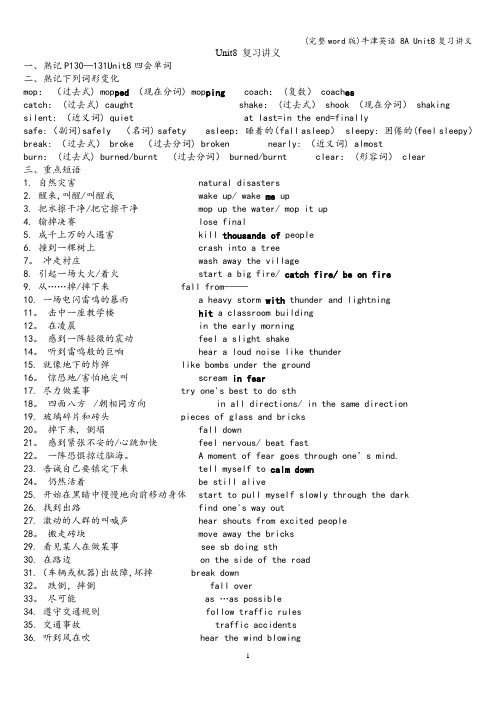
ring sb.意为“给某人打电话”,后可加up,即ring sb。 up,其同义词组有:give sb。 a call/ring,telephone sb。, call sb。, make a telephone to sb。
8.I felt nervous and my heart was beating fast.我感到紧张,我的心跳加快。 beat有两种意思: (1)意为:打,击,敲;冲击。如: He beat his brother for lying. 他因为他的兄弟说谎而揍他。 (2)意为:打败,胜过.与win区别:win和beat都可用作及物动词.作“赢,战胜”讲时,其区别主要在于宾语的不同。win的宾语通常是比赛、战争、奖品、金钱等名词,即race,match,game,competition,war,prize之类的词,beat的宾语则通常是比赛、竞争的对手,即人或球队的名词或代词。
11。 击中一座教学楼hita classroom
12。 在凌晨in the early morning
13。 感到一阵轻微的震动feel a slight shake
14。 听到雷鸣般的巨响hear a loud noise like thunder
15. 就像地下的炸弹like bombs under the ground
(2) because of意为“因为,由于",后接短语作宾语,不能接从句.because后可接原因状语从句.两者可替换。
如: They arrived late because the road was frozen。 =They arrived late because of the frozen road。 由于路面结冰他们迟到了。
译林牛津8A 全册八单元语法总结
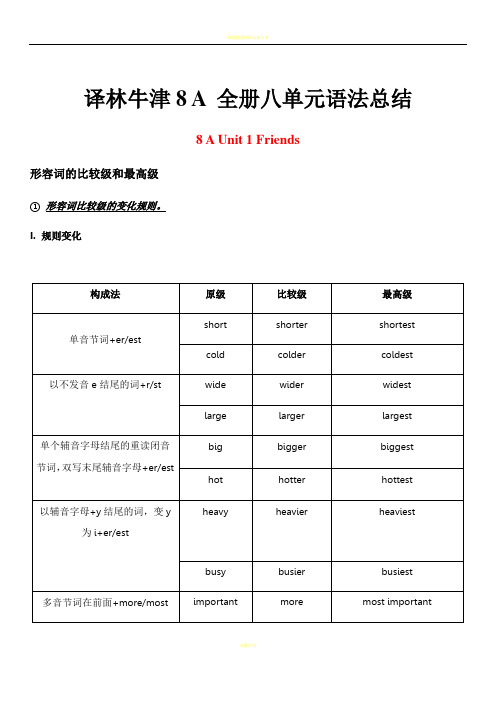
译林牛津8 A 全册八单元语法总结8 A Unit 1 Friends形容词的比较级和最高级①形容词比较级的变化规则。
I. 规则变化II. 不规则变化②形容词比较级用法。
I. 比较级用于两者进行比较,结构为“A is 比较级than B”。
e.g: 1. My bike is more beautiful than hers.我的自行车比她的漂亮。
2. He works harder than before. 他工作比以前努力。
II. 表示两者之间选择,用“which/who is 比较级,A or B?”表示“两者之间较……之一”时,用“the + 比较级”结构。
e.g: 1. Which is nearer to the sun, the moon or the earth? 哪个离太阳更近,月球还是地球?2. He is the thinner of the two. 他是两人中较瘦的那个。
III.“越来越……”用“比较级and 比较级”结构,多音节和部分双音节词用“more and more 原级”。
e.g: 1. The weather is becoming colder and colder. 天气变得越来越冷了。
2. She is becoming more and more beautiful. 她变得越来越美了。
IV. 表示“越……越……”时,用“the+比较级,the+比较级”结构。
e.g: The more careful you are, the more points you will get. 你越细心,得分越多。
③形容词最高级用法。
I. 表示三者及以上人或物进行比较时用最高级,结构为“the + 最高级+in/of + 范围”。
e.g: 1. The picture is the best of all. 这幅画是所有画中最好的。
2. She is the most beautiful girl in the class. 她是班上最美的女孩。
牛津8AUnit8知识点讲解

我害怕输掉这场比赛。
( )②We are_________ the typhoon.
A. in dangerB. in troubleC. in fear ofD. afraid
3. Outside, people were running in all directions while pieces of glass and bricks were fallingdown.
(2)进行时中一般用start to do sth.。
The weather is now starting to change.现在天气开始变了。
(3)在start之后有表示感情或思想(如:understand.realize等)的动词时,一般用start to do sth.。
Gradually,I started to understand him.渐渐地,我开始了解他了。
Listen to me,please.请听我说。
I listened carefully,but could hear nothing.我听得很认真,但什么也没听见。
[提醒]hear通常不用于进行时,要表达说话时听到什么,常用can hear。
I can hear somebody coming.我听见有人来了。(不能说I am hearing…)
[指点迷津]该句为否定疑问句。否定疑问句的构成及用法如下:
否定疑问句即否定形式的疑问句,汉语中常译作“难道……不……吗?”。比较:
Can he drive?他会开车吗?
→Can't he drive?难道他不会开车吗?
Do you think so?你这样认为吗?
牛津译林8AUnit8同步知识点讲解和练习

牛津译林8AUnit8同步知识点讲解及练习【知识梳理1】重点词汇、句型1.①two hundreds ①数字不能与“s” 共存two hundred of them ②数字可以与of共存,但后面要有the或者代词hundreds of the students ③”s”可以与”of” 共存,但后面不能有the②thousands of意为“成千上万”,后接复数名词Eg:There are over three__________workers in this factory, and_________of young people want to work in it.A.thousand;thousandB.thousands;thousandsC.thousand;thousandsD.thousands;thousand Keys:C2.①in fear 处于恐惧当中Eg:1. 一丝恐掠过我的脑海,但是我没有停下来。
______________________my mind, but I did not stop.2.—Did you hear the shouts_________the boy?—Yes.When I arrived there,I found the boy looking at a snake_______fear.A.from;inB.at;withC.from;withD.in;inKeys: A moment of fear went through(掠过);A;②cross、across、through 用法区别:平面穿过:cross vt. 穿过across prep 穿过内部穿过:throughEg:1.Don’t drive so fast! We must slow down when we drive_________the tunnel.A.pastB.acrossC.overD.through2.Nobody knows what’s going________ his mind. He doesn’t say anything.A.acrossB. throughC. aroundD.aboveKeys:D;B;3.direct v.执导/ adj.直接的;direction n.方向Eg:1.When the PE lesson was over, the students ran away in all_____________(direct).2.在听见枪声之后,鸟儿们四处飞窜。
初中英语 牛津译林版8A Unit8重要知识点知识点
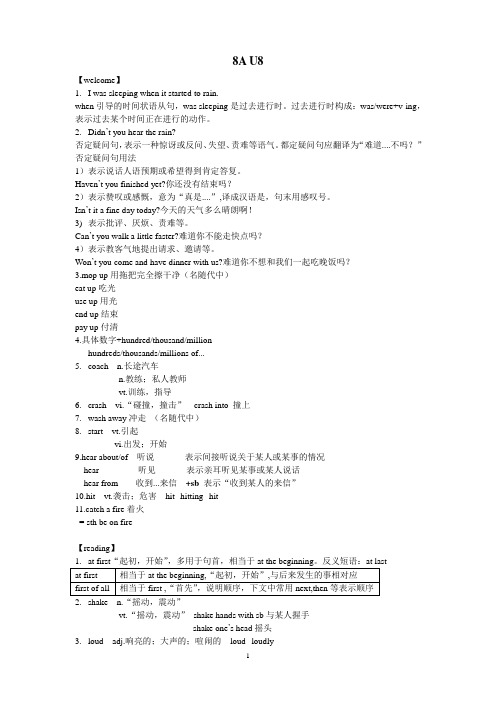
8A U8【welcome】1.I was sleeping when it started to rain.when引导的时间状语从句,was sleeping是过去进行时。
过去进行时构成:was/were+v-ing,表示过去某个时间正在进行的动作。
2.Didn’t you hear the rain?否定疑问句,表示一种惊讶或反问、失望、责难等语气。
都定疑问句应翻译为“难道....不吗?”否定疑问句用法1)表示说话人语预期或希望得到肯定答复。
Haven’t you finished yet?你还没有结束吗?2)表示赞叹或感慨,意为“真是....”,译成汉语是,句末用感叹号。
Isn’t it a fine day today?今天的天气多么晴朗啊!3)表示批评、厌烦、责难等。
Can’t you walk a little faster?难道你不能走快点吗?4)表示教客气地提出请求、邀请等。
Won’t you come and have dinner with us?难道你不想和我们一起吃晚饭吗?3.mop up用拖把完全擦干净(名随代中)eat up吃光use up用光end up结束pay up付清4.具体数字+hundred/thousand/millionhundreds/thousands/millions of...5.coach n.长途汽车n.教练;私人教师vt.训练,指导6.crash vi.“碰撞,撞击”crash into 撞上7.wash away冲走(名随代中)8.start vt.引起vi.出发;开始9.hear about/of 听说表示间接听说关于某人或某事的情况hear 听见表示亲耳听见某事或某人说话hear from 收到...来信+sb表示“收到某人的来信”10.hit vt.袭击;危害hit--hitting--hit11.catch a fire着火= sth be on fire【reading】vt.“摇动,震动”shake hands with sb与某人握手shake one’s head摇头3.loud adj.响亮的;大声的;喧闹的loud--loudly4.in fear处于恐惧状态5.try/do one’s best to do sth尽某人最大的努力做某事6.run out跑出来;(时间、食品、金钱等无生命名词)用完run out of 从...跑出来;把...用完7.in all direction = in every direction 四面八方8.fall down ①“掉落;下落”②“跌倒,倒下”后面接宾语时要加介词fromfall over “跌倒”,一般指向前摔倒,其后不加宾语fall off “跌落,从...掉下来”,后面可以直接加宾语e down ①崩塌,坍塌②(价格)下降10.not...at all “一点也不,根本不”,at all放在句尾用于加强否定的语气。
unit 8重点知识点牛津版英语八年级上册

8A Unit 8 知识点第一课时Welcome to the unit1. Didn't you hear the rain?①注意这类否定的问句的回答,用补全方式:-Didn't you hear the rain? -Yes, I did (hear). / No, I didn't (hear).2. When I woke up, there was water everywhere!① When I woke up 是时间状语从句,与主句的时态关系是:主将从现,主过从过;② everywhere adv. 在各个地方,到各个地方,处处注意: to/in everywhere (×) 介词与副词不连用anywhere adj. 无论何处,随便哪里He travelled everywhere in Europe. 他走遍了欧洲各地。
(欧洲范围内)I hope to live anywhere like here. 我希望住在任何像这儿的地方。
(无范围限制)3. Who will mop up the water if I go home without you?① mop up the water = mop the water up 注意: mop it up (adv. )wake up醒来eat up吃光put up搭建;挂起来catch/keep up with追上cheer up (使)振作起来clear up清理干净clean up收拾干净come up with 想起,想出look up查找;抬头看open up打开;开放pack up打包pick up摘;中途乘载set up建立stay up late 熬夜take up占据(时间,地方)dress up as装扮成give up放弃hurry up赶快② go home without you不带你就回去4. Lightning hit a classroom building and it caught fire.catch fire着火(瞬间动词) be on fire着火(延续性状态)make a fire 生火5. Was anyone hurt? Nobody was hurt.hurt vi. 感到疼痛(hurt - hurt ) Eg. My head hurt. 我头疼。
- 1、下载文档前请自行甄别文档内容的完整性,平台不提供额外的编辑、内容补充、找答案等附加服务。
- 2、"仅部分预览"的文档,不可在线预览部分如存在完整性等问题,可反馈申请退款(可完整预览的文档不适用该条件!)。
- 3、如文档侵犯您的权益,请联系客服反馈,我们会尽快为您处理(人工客服工作时间:9:00-18:30)。
8A Unit8 Natural disasters知识点整理1.lose the final 输了决赛2.wash away the village 冲走村庄3.crash into the tree 撞上树4.start / cause a big fire 引起一场火灾catch fire 着火5.fall from a tree 从树上掉下来6.tell sb about sth 告诉某人关于某事tell sb (not) to do sth 告诉某人做/不做某事7.in the early morning 在凌晨in the late afternoon 在傍晚8.feel a slight shake 感到轻微的晃动9.scream in fear 恐惧的尖叫10.fall over 绊倒,摔跤11.thick smoke 浓烟12.follow traffic rules 遵守交通规则13.fall to the ground 掉到地上14.move away the bricks 搬开砖块15.see the bright daylight 看到光明16.walk to the bus stop 走到车站(小)the bus station 车站(大)17.stand on the side of the road 站在路边18.wait for a taxi 等待出租车19.ring sb to do sth 打电话要某人做某事20.learn from sb向某人学习learn...from... 从...学到...21.protect sb. from.. 保护某人免遭...22.shout/cry for help 大声呼救ask for help请求帮助23.try to get out as soon as possible 试图尽快的逃出去24.natural disasters 自然灾害25.cross the road= go across the road 过马路26.get to high ground and stay there 到达高的地面并呆在那儿27.hide under a strong desk or table to protect yourself躲在坚固的课桌或桌子下来保护你自己28.Please stay/keep away from danger. 请远离危险。
29.My heart was beating fast.我心跳的很快。
30.Was anyone hurt? 有人受伤吗?31.Suddenly, a strong wind came from behind. 突然,身后有一阵强风袭来。
32.People were trying to clear the snow from the streets. 人们正试图清理街上的积雪。
33.I heard the noise of traffic the next morning.第二天早上,我听到车辆的喧闹声。
34.A snowstorm hit Beijing on Friday, 5 January.在1月5号的星期五,一场暴风雪袭击了北京。
35.The snow kept falling. 雪不停的在下。
36.I could hear the wind blowing. 我能听到风吹的声音。
37.I was sleeping when it started to rain. 当我正睡觉的时候,开始下雨了。
38.It was dark and silent around me. 我周围一片黑暗与寂静。
39.Finally, the noise and shaking ended. 最后,噪音和晃动停止了。
40.We may burn our hands when we cook at home.我们在家做饭时也许会烧到手。
41.Luckily, there was just enough space for me to move. 幸运的是,正好有足够的空间够我移动。
42.Hours later, as I was trying to find my way out, I suddenly heard somenoise above me.数小时过后,正当我努力找出路时,我突然听到我上面有一些声音。
43.What a terrible snowstorm! It started at about seven this morning.多么可怕的暴风雪啊!在今早七点开始下了。
44.My dad’s car broke down because of the cold weather. 由于寒冷的天气,我爸爸的车出故障了。
45.I started to pull myself slowly through the dark. 我开始慢慢的在黑暗中拖动自己的身体。
46.When I woke up, there was water everywhere. 当我醒来时,到处都是水。
47.Who will mop up the water if I go home without you?如果我不带你回家,谁将把水拖干净呢?48.Did you hear about/of the fire at a school in the UK last week?你听说上周英国一所学校里的那场火灾了吗?49.There was a heavy storm with thunder and lightning. 有一场电闪雷鸣的强烈暴风雨。
50.Lightning hit a classroom building and it caught fire. 闪电击中了一所教学楼,然后它着火了。
51.I was sleeping when the earthquake started.当地震开始的时候,我正在睡觉。
52.Then I heard shouts from excited people.然后我听到了来自于激动的人们的尖叫声。
53.54.What should we do if our building is on fire?如果我们的建筑着火了,我们应该做什么?55.56.Soon the real noise came, like bombs under the ground. The earthstarted to shake.很快真的声音传来,像地底下的炸弹。
地球开始晃动。
57.58.Don’t stand near a window. 不在站在窗户附近。
59.Never go back into the building on fire.不要返回着火的建筑物。
60.It’s dangerous to sit, walk or ride a bicycle on railways.在铁轨上坐着,散步,或骑自行车是危险的。
61.I tried my best to run out too, but I could not. 我也尽力往外跑,但我不能。
62.Outside, people were running in all directions while pieces of glass and bricks were falling down.外面,当玻璃与砖块的碎片掉落下来的时候,人们正跑向四面八方。
63.64.I could not see anything at all, and I did not know if anyone else was near me.我什么也看不见,不知道周围是否有人。
65.66.67.A moment of fear went through my mind, but I told myself to calm down since I was still alive.一阵恐惧掠过我的大脑,但我告诉自己要冷静下来因为我还活着。
68.69.We learnt a lot about keeping ourselves safe from fires, floods,earthquakes and traffic accidents. 我们了解了很多保护我们的安全,远离火灾,水灾,地震和交通事故。
70.71.72.73.I was doing my homework in the classroom when Mr Wu came in and told us to go home early. 当吴老师走进教室,告诉我们早点回家时,我正在做家庭作业。
74.75.I shared my umbrella with her while we were walking to the bus stop.当我们走向车站时,我和她用同一把伞。
76.Remember that we shouldn’t walk through the flood water.记住我们不应该在洪水中行走。
77.78.First, you should keep your hand in cold water for about ten minutes.首先,你应该将手放在冷水里大约10分钟79.We should use a wet towel to cover our mouth and nose and stay low to the ground.=We should cover our mouth and nose with a wet towel and stay low to the ground. 我们应该用湿毛巾来捂住我们的口鼻,重心降低。
